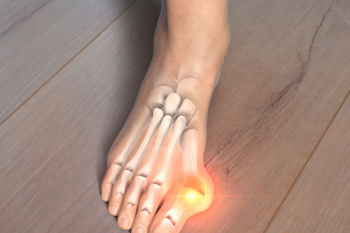
A bunion is characterized by a protrusion at the base of the big toe. It manifests as a bony bump caused by the misalignment of the joint, often leading to the big toe pushing against the adjacent toes. Bunions vary in severity, classified into degrees based on visual cues. Mild cases exhibit slight deviations of the big toe, with minimal outward protrusion. Moderate bunions display more pronounced misalignment and a visible bump. Severe bunions are marked by significant joint displacement, causing the big toe to angle drastically toward the other toes. The visual features include redness, swelling, and sometimes pain surrounding the affected area, affecting mobility and comfort. If you have developed a bunion, it is suggested that you contact a podiatrist who can offer you effective relief and treatment remedies.
If you are suffering from bunion pain, contact one of our podiatrists of Bergen Foot & Ankle. Our doctors can provide the care you need to keep you pain-free and on your feet.
What Is a Bunion?
Bunions are painful bony bumps that usually develop on the inside of the foot at the joint of the big toe. As the deformity increases over time, it may become painful to walk and wear shoes. Women are more likely to exacerbate existing bunions since they often wear tight, narrow shoes that shift their toes together. Bunion pain can be relieved by wearing wider shoes with enough room for the toes.
Causes
- Genetics – some people inherit feet that are more prone to bunion development
- Inflammatory Conditions - rheumatoid arthritis and polio may cause bunion development
Symptoms
- Redness and inflammation
- Pain and tenderness
- Callus or corns on the bump
- Restricted motion in the big toe
In order to diagnose your bunion, your podiatrist may ask about your medical history, symptoms, and general health. Your doctor might also order an x-ray to take a closer look at your feet. Nonsurgical treatment options include orthotics, padding, icing, changes in footwear, and medication. If nonsurgical treatments don’t alleviate your bunion pain, surgery may be necessary.
If you have any questions, please feel free to contact our offices located in Fort Lee, NJ and Flushing, NY . We offer the newest diagnostic and treatment technologies for all your foot care needs.
